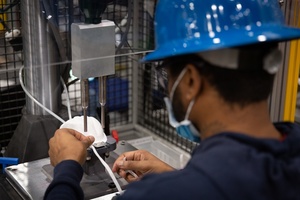NHS volunteers extend support to frontline health and social care staff
- NHS Volunteer Responders scheme expanded to offer vital support to frontline health and social care staff
- Over 285,000 volunteer tasks have been carried out so far, helping people from across the community with tasks like delivering shopping
- Announcement comes as part of Volunteers Week 2020
NHS volunteer responders will be carrying out socially-distanced tasks including helping with delivering food shopping and dropping off personal medication to frontline staff at their homes.
While the country is moving into a new phase in the national effort against this pandemic, health and social care staff on the frontline continue to provide vital care and support to our loved ones, many of whom will still be shielding.
From Monday, the NHS volunteer responders will extend their support to health and social care workers across the country, helping them to protect those they care for by making fewer journeys and coming into contact with fewer people so they can focus on and continue their vital work.
Minister for Care, Helen Whately said:
The NHS volunteer responders have played a vital role in our response to coronavirus, and I am hugely thankful for their support. Their selfless efforts to protect those who need to shield or self-isolate has helped stop the spread of the virus and alleviated pressure on health and care services during this unprecedented pandemic.
Following the success of the volunteers scheme, support is now being extended to all our wonderful health and care staff who continue to go above and beyond.
We want to support them in whatever way we can to make their lives easier while they continue to support others most in need.
Since the beginning of April, NHS volunteer responders have completed hundreds of thousands of acts of support and kindness, helping vulnerable individuals, the shielded population, and supporting those who are self-isolating or caring for others.
Yesterday, as part of Volunteers Week, Care Minister Helen Whately conducted a ‘check in and chat’ session with an individual self-isolating in Oxfordshire. Check in and chats are a friendly chat between volunteers and individuals who are shielding or self-isolating and provide short-term telephone support to individuals who are at risk of loneliness as a consequence of self-isolation.
Neil Churchill, Director of Patient Experience, Participation and Equalities at NHS England said:
Thanks to the kindness of the British public, our army of volunteers have helped thousands of people across the country in their greatest time of need.
These helpers continue to be on hand to support the most vulnerable people in our society and it is fantastic that this invaluable offer is now being extended to help our dedicated NHS staff who continue to work day and night to care for thousands of people during the pandemic.
Catherine Johnstone CBE, Chief Executive of Royal Voluntary Service said:
NHS volunteer responders stepped forward to support during the coronavirus pandemic and as we enter the next phase of our fight against the disease, I’m delighted that their help can now also be called upon by staff working in health and social care. The opportunity for frontline staff to access help with their shopping and prescription deliveries will free up more of their time to care.
Professor Martin Green OBE, Chief Executive of Care England said:
Care England welcomes this new scheme for volunteers to support social care staff. Our staff are our biggest resource and we know that the scheme will make a difference in reducing the potential for staff to come into contact with COVID-19.
The NHS volunteer responders programme was developed by NHS England in partnership with the Royal Voluntary Service and facilitated by the Good Sam app.
Volunteers carry out simple, one-off non-medical tasks to support people in England who need help with accessing essentials or who would benefit from a friendly chat to help prevent loneliness.
The programme is also providing support to NHS and local authorities with transport tasks such as delivering blood pressure monitors to patients or transporting small quantities of PPE to care homes.
NHS volunteer responders is a new scheme established as part of the COVID-19 response, involving volunteers who carry out simple, non-medical tasks to support people in England. The scheme helps people to stay safe and well at home.
The support of NHS volunteer responders is now available to anyone who:
- has been advised to shield by a health professional
- is vulnerable for another reason (for instance disability, pregnancy, over 70, have Parkinson’s, epilepsy, or are vulnerable due to a mental health condition)
- is self-isolating because they have confirmed COVID-19 or suspected symptoms, or they have been in contact with someone who has
- is someone with caring responsibilities, if this support helps them to continue in their caring role
NHS volunteer responders have been recruited for 5 key roles:
- community response volunteer: this involves collecting shopping, medication or other essential supplies for someone who is self-isolating or vulnerable, and delivering these supplies to their home
- community response volunteer plus: these volunteers can collect and deliver shopping, medication or other essential supplies for patients with cognitive impairments and or significant vulnerabilities, and who are shielding
- check-in and chat volunteer: this provides short-term telephone support to individuals who would benefit from someone to talk to during their self-isolation
- patient transport volunteer: these volunteers providing transport by car to patients who are medically fit for discharge, as well as taking patients to their essential appointments
- NHS transport volunteer: this involves transporting equipment, supplies and/or medication between NHS services and sites; it may also involve assisting pharmacies with medication delivery
NHS volunteer responders are not intended to replace local groups helping their vulnerable neighbours but is an additional service provided by the NHS.
The NHS and Royal Voluntary Service continues to encourage those needing support to self-refer by calling 0808 196 3646.
